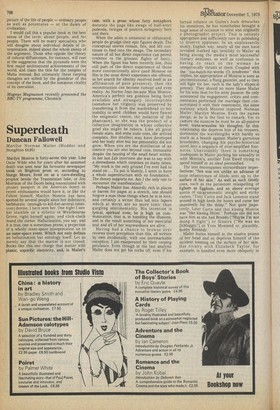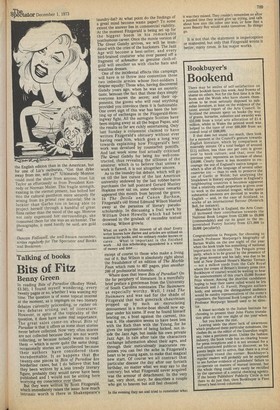Superdeath
Duncan. Fallowell
Marilyn Norman Mailer (Hodder and Stoughton £4.95)
*Marilyn Monroe is forty-seven this year. Like Oscar Wilde who for years after his assumed death was seen near his favourite newspaper kiosk on Brighton prom or, according to Sturge Moore, lived on as a cave-dwelling prophet beside the Trasimenian lake, or Jim Morrison of the Doors being resuscitated with phoney passport in the American desert as recent enthusiasms would have it, or like the Fuhrer himself, Marilyn Monroe has been spotted by several people since her indecisive, barbiturate (enough-to-kill-her-several-timesover) demise. I have seen her. One night I saw her stumble on a stiletto in Westbourne Grove, right herself again, and click-clack round the corner. Hallucination, you say, and it is true, one is sometimes prone, a projection of a wholly inner-space interpretation on to an outer-space event. Which not only defines an hallucination but ontology itself. Let us. merely say that the matter is not closed., Books like this one charge that matter with plastic, soporific electricity, and, in Mailer's case, with a prose whose fatty metaphors decorate the Page like swags of half-erect pudenda, twinges of positive stringency here and there.
When the adieu is unnatural or obfuscated, people do grudge their epic figures death. The conceptual sinews remain, flex, and life continues to feed into the image. The secondary nature of all but direct experience can permit credence to the grossest flights of fancy. When the figure has been recently lost, thus still pail of the direct experience of those more conventionally alive (and Monroe on film is the most direct experience she offered, as her search for identity resolved itself in an affirmation of pure presence), then the reconstruction can become rumour and even reality. As Norma Jean became Miss Monroe, America's perfect sex goddess being both available and strangely incorruptible. (somehow her virginity was preserved by transferring it from the maidenhead to her inability to seed: children would have flawed the enigmatic centre, the isolation of the phantasm), so she was the product of a collective imagination in whose collective grief she ,might be reborn. Like all great female stars, and some male ones, she arrived complete. Her intellect may have developed and her body alter but her personality did not grow. When you are the distillation of an essence you are also beyond time, immutable despite the beating of the small heart within. In her last Life interview she was to say with a shrewdness which surprises us many times, "My work is the only ground I've ever had to stand on ... To put it bluntly, I seem to have a whole superstructure with no foundation." The theory supports me. Am I the only one to encounter the manifestation?
Perhaps Mailer has. Absurdly rich in places or barren for pages at a stretch, one should forgive a man these things when he is in love, and certainly a writer thus led into lapses which at worst are no more toxic than gurgling sentimentality. His intention is lyrical, spiritual -even; he is high on communication, that is, in handling the illusions, and in the result something of her mercurial soul and all of her waywardness are alive.
Having had a chance to browse over reviews more precipitate than this, all written by men incidentally, with one unremarkable exception, I am exasperated by their carping petulance. Even though in the last analysis Mailer does not get his rocks off, even if his
factual reliance on Guiles's book debauches his intentions, he has nonetheless brought a huge sense of occasion to what was originally a photographic project. This is entirely appropriate and sufficiently rare in publishing to deserve applause. In an. unpleasantly. snotty, English way, nearly all the men have revealed marked ego hostility to Mailer as being among the media's most successful literary denizens, as well as confusion in having to react to the woman he unequivocally thrusts at them. Coupled with the 'too-butch-for-words (!) syndrome' this implies, his appropriation of Monroe is seen as ,unconstitutional, a flung gauntlet, and so they still fight for her, such is the lady's elliptical potency. They should no more blame Mailer for his wits than for his artsy passion. He only announced the engagement, critics and corn.mentators performed the marriage then consummated it with their resentment, the same jealousy which Monroe inspired. Norman Mailer : Marilyn Monroe. Even the names merge, as he is the first to remark. Yet to capture the nuances he must be an all-passive lover, trans-sexualise his thoughts. In this relationship she deprives him of his trousers, dominates the wavelengths with hardly so much as a breath against Mailer's garrulous broadsides, changing his psycho-historical novel into a sequence of over-amplified footnotes. Unavoidably there is something inadequate in Mailer pitching his sexuality in with Monroe's, another Tom -Ewell trying to spend himself in an ideal personified. The text encompasses extraordinary imperfections: "Sex was not unlike an advance of -little infantrymen of libido sent up to the surface of her skin." As well as such timely ones, such as the persistent misspelling of Egham as Eggham, and an above average quota of epigrammatic insight and etchy cameo. "Tony Curtis and Jack Lemmon stand around in high heels for hours and curse her impotently for the delay." Not quite ,simpotently. Later Curtis said that kissing Monroe was 'like kissing Hitler." Perhaps she did not have him as she had Brando ("Maybe I'm not doing it right") or Sinatra ("He was no DiMaggio") or Yves Montand or, plausibly, Bobby Kennedy.
Mailer buries himself in the elusive prisms of her head and so deprives himself of the incident teeming on the surface of her skin. Her rivalry with Elizabeth Taylor, for example, is handled even more obliquely in
the English edition than in the American, but for one of Liz's outbursts, "Get that dyke away from me, will ya?" 'Ultimately Monroe could steal the show from anyone, from Liz Taylor as effortlessly as from President Kennedy or Norman Mailer. This fragile strength, existing in the eternal present, has bolted her into the cultural pantheon more securely fOr arising from its primal raw material. She is luckier than Garbo too in being able to project herself through a handful of great films rather than the mood of the age. Monroe not only expressed her surroundings, she consumed them for she was an alchemist. The photographs, it need hardly be said, are gold leaf.
Duncan Fallowell, the well-known raconteur, Uwites regularly for The Spectator and Books -and Bookmen.











































 Previous page
Previous page